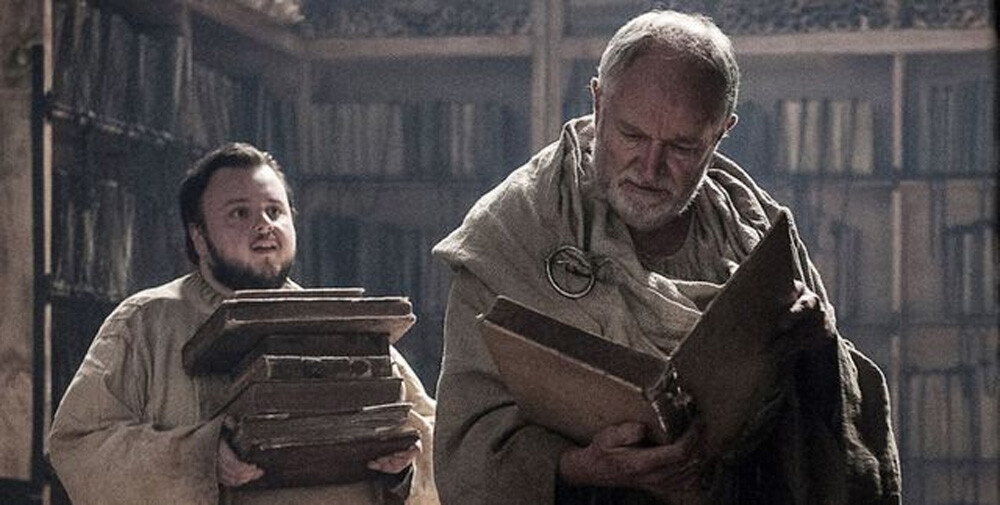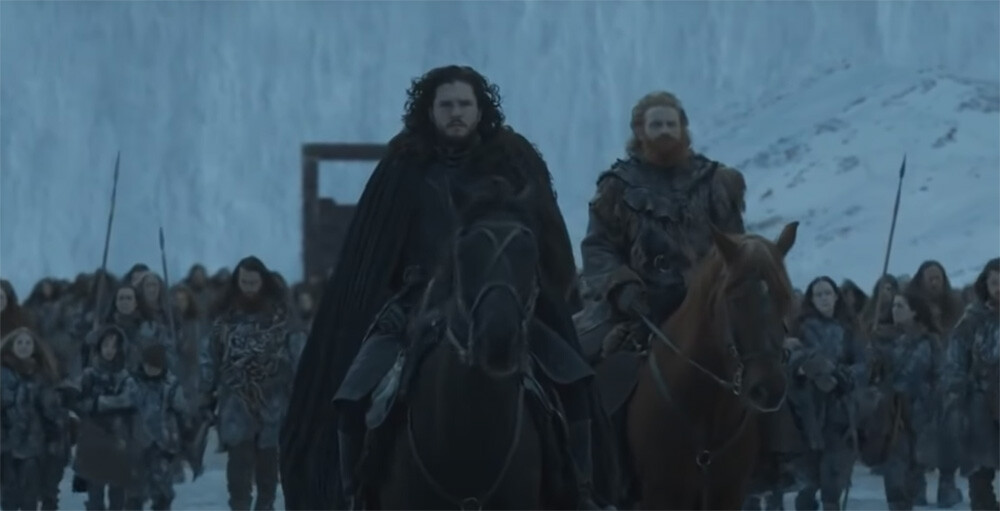4 Movies And Shows That Raised Fascinating Questions (Then Just Threw Them Away)

It’s a lot easier to come up with questions than answers, unless you’re playing Jeopardy!, or the answer is 42. For example, I can very solemnly ask you, “What does it mean to be human?” Then I can leave without ever answering what “human” means, or even clarifying what the question means.
Many questions are so tough that we can hardly blame movies for failing to answer them. But we still do get a little annoyed by cases like the following ones, when they seem to forget they ever introduced the question in the first place.
Game Of Thrones: “How Do We Face A Threat That Can’t Be Fought?”
Yeah, yeah, Game of Thrones shat the bed at the end—we all know that already. They especially shat the bed when it came to handling their zombie horde, the White Walkers. But viewers disagree on exactly how the writers shat that bed.
Maybe we would have liked it had the battle been more epic, or at least more visible? Maybe we would have forgiven everything if zombie Hodor rode the ice dragon? Maybe the problem was who landed the final blow. Maybe Jon should have killed the Night King. Or Jaime!
But no—I’m convinced that even if the show ticked every box for what makes a satisfying fantasy finale, it would have betrayed this plot’s promise.
Because earlier, the undead approaching from the north weren’t just yet another army to meet in battle. They were an unstoppable force. Rather than a new target to justify militarism, they were a different kind of threat, which spoke to the limits of militarism. They stood in for many real-world problems that can’t be eliminated just by shooting at them and that a preoccupation with warfare prevents us from solving. George R.R. Martin agrees the White Walkers are like climate change, but feel free to substitute whichever challenging problem you consider the most serious.

HBO
Opposing sides must unite to solve those kinds of problems, but if they unite by combining armies and pointing their swords in the same direction, well, that’s like Batman and Superman teaming up to kill Doomsday or King Kong and Godzilla teaming up to kill Mechagodzilla. It’s a move right out of a kids’ cartoon. It’s the exact same action and violence the story offered before, except simplified because it’s now directed against a mindless, disposable opponent.
If we're just going to have a battle and beat them, mindless unsympathetic invaders are less interesting in every way compared to, say, the last army who invaded from the north, the Wildlings—the fight against whom was so gripping to watch because we didn't actually want either side to lose. The mindless unsympathetic invading dead were only interesting when they couldn't be beaten, when they were a force of nature rather than combatants, and the show could have maintained till the very end that no army could defeat them. That would still leave a few options for how to wrap up the story.
The leaders of Westeros could make peace and then commit to staying forever vigilant against the undead threat. The show would end with the castles along The Wall getting rebuilt and people from every side on top, looking north toward a threat that can never be beaten, only contained.
That sounds like a deeply unentertaining ending, but remember that the actual show did end with all the surviving leaders meeting peacefully and deciding the fate of the land. This ending to the walker story would have to come after some battle over the throne—a battle that, afterward, all survivors agree wasted resources and distracted from the real issue.

HBO
because they forgot neither still served a purpose and both had been destroyed
Or, better than that, they could have ended with a big fight with the walkers after all. Except, the walkers would win this fight, easily. Picture the carnage we got when that dragon burned King’s Landing, except we’ll feel the actual horror the writers wanted us to feel, instead of just muttering to ourselves, “Why are they doing that? That doesn’t make any sense.”
Some named characters would survive. They’d take to the sea, because the entire continent is lost to the dead and winter. The iron throne? It’s the Night King’s now. Or, walkers rip the throne apart (which means something in this ending, unlike the dragon destroying the throne in the finale we got, because here, no more kingdom remains to rule over).
Cracked readers can probably think of 17 endings better than either of those. But all these better endings must have that undead swarm really be a bigger threat than any other army. In the show we got, they turned out to be less of a threat than any other army, because you could disintegrate them all simply by killing one keystone guy, and everyone knew it. Dammit, generals of Westeros. A week before the big battle, you could have just hired one of those magic assassins to kill the Night King, and that would have ended everything.
Yesterday: “Does Art’s Value Outweigh The Cost To The Artist?”
The film Yesterday sends a character into a parallel world, which is just like ours except The Beatles never came together and made music. Our protagonist Jack is now the only person who knows Beatles songs, and so he moves to Los Angeles and becomes famous pretending he wrote those songs himself. Cool premise, but the movie doesn’t find something very interesting to do with it. Most of the story covers Jack deciding whether to return to his girl back home or whether he's going to lose that girl living the rock star life—a choice that, you’ll note, could fit any story about a rising artist, even one featuring no universe hopping or missing Liverpudlians.

Universal Pictures
Then, with half an hour left in the movie, we get a twist. Jack meets two people from his own reality, people who know he’s ripping off The Beatles. Naturally, he thinks they’re about to shout at him and unmask him, but they don’t. They thank him. They love Beatles music and have no talent themselves, so he’s their only way of hearing the songs again.
This should change everything. Up till now, Jack’s moral dilemma was all about himself: Should he enjoy fame, or should he tell the truth? Suddenly, though, he doesn’t matter. What matters is the music and the pleasure it gives people. If he cares about that, he now has to spend the next decade or so reconstructing every Beatles song from memory and recording them all, for the world’s sake.
Which sounds like a very convenient obligation, if he wanted to be a rock star anyway, but it’s more complicated than that. Reconstructing the Beatles catalogue from memory is turning out to be very hard, now that he’s exhausted the short list of tracks he knows best. He’s already having trouble remembering the lyrics to even some of the band’s less obscure songs that he really should have known better.

Universal Pictures
This setup in Yesterday doesn’t say anything about real-world plagiarism, by the way. Never in the real world can you only share someone’s work by claiming you made it yourself. But this setup does relate to art in general.
Imagine you have a special talent. Say you're a paperback writer, or no—let it be that you’re innately good at thinking of words that rhyme with “dong,” therefore are greatly skilled at writing dirty limericks. You enjoy this vocation, but it occurs to you that every moment you spend relaxing with friends is a moment you could (and should) instead be spending writing additional limericks about penises.
People similarly grapple with how much time in their life they must devote to their job or to help for the needy, but art offers a unique dilemma. As an artist, you are truly irreplaceable—if you fell behind schedule and miss writing one limerdick, no one will ever write that specific one, and if you do write it, it will last forever and entertain infinite people across the universe.

Universal Pictures
Jack in Yesterday chooses to give up the life of a professional musician and get back with that girlfriend of his. That’s one of several perfectly valid answers to the question of how to balance your desires versus what you can create for the world—maybe if she loves you, that’s all you need, maybe you owe nothing to the world and to the music. However, the movie does not offer this as an answer to THAT question.
Instead, the movie treats this as Jack choosing truth and love over deception and success, like meeting that couple didn’t complicate his choice at all. He very publicly announces that he’s releasing for free all the music he already recorded, as though money were the centerpiece of his moral quandary, but he says nothing about recording and sharing future Beatles tracks. In the end, he becomes a small town music teacher, teaching simple Beatles songs to children, but there’s no mention of him also sneaking songs to the wider world (or of him actively deciding he doesn’t need to). For the sake of the world, let’s hope those some of those kids are prodigies and blow up TikTok with their own Beatles covers before they forget how the songs go.
The choice highlighted for Jack, “girlfriend or fame,” was always a dumb one, incidentally. He could work it out and get both by just inviting her to live with him in Los Angeles. Or he could stay in England and still be famous. That small town he’s from? It’s 100 miles from London. We’re like 80% sure London too has a recording industry.
No Time To Die: “What If We Could Eliminate Entire Bloodlines?”
Quite a few movies and video games have the concept of the DNA-specific virus, a pathogen that targets one specific person based on their genetic code. This kind of sci-fi weapon leaves us thinking, “Wait, is this awesome, or is this stupid,” leading to many long back-and-forth debates. No Time To Die starts out with one such virus, but once the villain Safin (Rami Malek) gets his hands on it, he alters it. Now, the virus can kill not just a target but also anyone related to them.
Wow, this introduces all kinds of terrible possibilities. As Q and one of the henchmen discuss, maybe the villain could now wipe out whole ethnicities—which is a subject, er, previously explored by history, but this virus could pursue that goal with a whole new level of evil effectiveness. Or maybe he could use the virus to kill all members of a family, such as a royal family. Maybe he could try to kill every single person who shares some kind of physical trait.

Universal Pictures
Two hours into the movie, we learn Safin’s plan. He will use the virus to kill ... millions of people, all over the world. No particular type of people, as far as they tell us. Just millions of people in general. Well damn. If that's the plan, he didn't need nanobots that target specific DNA. He could have used any ol’ supervirus.
In fact, though characters deploy the virus as a weapon a bunch of different times in the movie, not once does the bloodlines-targeting aspect come into play. Early on, Safin wipes out Spectre, but Spectre members aren’t related, so he must have used numerous different viruses, one targeted to each member. Separately, he kills Blofeld, without also targeting Blofeld Junior, Blofeld the Third, etc. Finally, he makes a virus that can kill Madeline and her daughter, which is something, but since he has access to both of them, he could have accomplished the same thing with two viruses, one for each, again without targeting the whole bloodline.

Universal Pictures
And what is Safin’s motive for killing millions of people? They never quite get around to revealing that. He says something about wanting to let humanity evolve, and while we could fill in the gaps using our boundless imaginations, we’d expect a Bond villain to explain himself in more detail. Plus, he also sells the virus to unnamed buyers, so maybe he doesn’t even care about which targets die, he’s doing it for the money?
Possibly, all of Safin’s lines were placeholder text. At one point, he straight-up gives Bond a speech about how the two are not so different. You can picture the script had an asterisk in this section, while a footnote said, “Haha, but seriously, actual monologue to be added later.”
The Matrix: Resurrections: “How Do We Reconcile Our Fantasies With Mature Responsibility?”
Early on in the new Matrix movie, Thomas Anderson’s therapist assures him that he’s merely imagining someone trying to break him out of a worldwide VR prison. And if Mr. Anderson thinks the events we call the Matrix trilogy really happened to him, well, those are delusions as well.
You might have seen this same trope in other self-aware, wacky stories (Lost, Buffy, Community), where the show uses it to poke fun at its own wish fulfillment themes. It hits extra hard here because the original Matrix story was already about a false reality. Now, the script is telling you, “No, being stuck in a dull job isn’t a comforting fantasy created to control you. That’s life. Someone fighting robots and flying as the Messiah? That’s the fantasy, and every element there stands in for something serious from that sadly-not-fake world you thought you could escape.”

Warner Bros.
Well, that doesn’t last. Of course it doesn’t—if this movie declared the original trilogy to be one man’s fantasy and spent the rest of the runtime with Keanu Reeves and Carrie-Anne Moss talking wistfully in a café, some would have enjoyed that, but other viewers would have committed actual murder. No, the matrix really exists, and Neo gets freed from it once again. Still, the movie has a chance to return to the idea of your mundane grounded life being not so easy to discard.
Half an hour before the movie ends, for reasons too complicated to summarize, everything comes down to whether Trinity chooses to leave the matrix. She of course does choose to, doing so as soon as she realizes her memory's accurate and there’s a matrix to leave. But thanks to the setup, this choice should feel a lot more difficult than the movie makes it appear.
Up till now in the series, life in the matrix offered the main characters just one good thing: comfort. In the matrix, you eat steak. The red pill, meanwhile, gives the characters truth, superpowers, companionship, adventure, purpose, orgies, mech suits, and self-actualization. It’s not a choice at all; everyone should leave. But in Trinity (or Tiffany, as she’s now called), a character for the first time has something to lose by leaving the matrix. She has a family.

Warner Bros.
In this story, her family is her burden, much like how Neo’s job is his burden, but think about what family really means. Neo and Trinity didn’t wake up in the matrix in the first scene of this movie, with a lifetime of false memories implanted in their heads. They have really been living in this matrix for decades. Tiffany met this guy Chad, had sex with him for years, gave birth, and raised three children. Though she was in the matrix during all this, her decisions, emotions, and relationships during that time were all real.
She can still choose to leave her family. Sometimes, people do leave their families. But her history with them complicates that choice to leave, making it a choice that should take more than two seconds to decide. Her life as a California mom has given her about as much resentment as the average middle-aged viewer has toward their own life and family; even with this resentment, she must feel the same way toward her family as most mothers in her position do. I think you humans call it “love.”
Her children are human beings, as far as we know (most people in the matrix are). And even if they aren’t, if her entire family are programs, this movie tells us programs are people too. Programs have free will. As Sati shows, they can love, age, and be raised by (loving) parents. They can ally with the heroes. They can even leave the matrix, either moving to a computer outside the matrix or taking physical form in the real world. Any thoughts about bringing your kids with you, Tiffany, when you abandon your family of 15 years for the cool ex you knew for a total of a few months several decades ago?

Warner Bros.
but we don’t have time to talk about those
I’m not saying this movie should have been all about Tiffany, the most special girl in the world, being unable to choose between two boys, each with their own supernatural abilities. But a lot of people do treat these legacy sequels like fan fiction, right? And hey, if fan fiction is anything to go by, this all ends with her choosing both of them. “Maybe this doesn’t have to be a binary,” she’d say, echoing a line from earlier in the script. And then a porn saxophone cover of Rage Against The Machine starts playing.
Follow Ryan Menezes on Twitter for more stuff no one should see.
Top image: Universal Pictures
